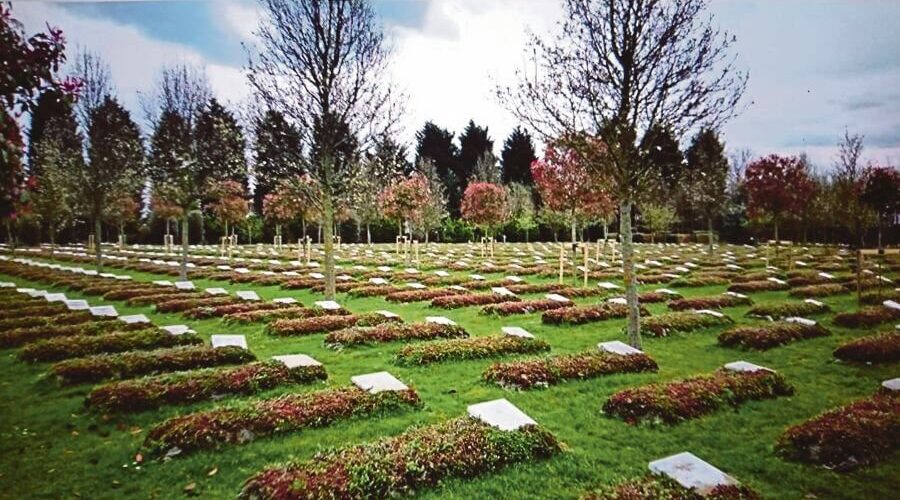Women Visiting The Grave

Getting your Trinity Audio player ready...
|
Question
Is it prohibited (ḥarām) for a woman to attend/follow a funeral procession? What is the position also in relation to visiting the graves or graveyard?
Answer
- There is no prohibition on either count.
- Neither is there a restriction that prevents women from either attending the funeral procession or visiting the graves.
Reasoning
Accompanying this question was a short-written submission which purported to outline a prohibition on both points. Although not written by the individual asking the question, it is from among the most commonly held viewpoints on this subject. That has not been published here, because quite frankly, it is an embarrassment. Not only is there a complete lack of understanding the Islamic textual sources, but it also has a misogynistic undertone.
Amongst some quarters, to even mention the word ‘grave’ or ‘woman’ seems to provoke what can only be described as a bizarre retreat into irrationality. Permeating the supposed answer to this question were references to ‘causing fitnah’, ‘temptation’ and other arguments which have no legal basis. Rather, they are phantasms of a warped mind-set. In the Qur’ān, Allah has stated [4: 59] quite explicitly:
يَا أَيُّهَا الَّذِينَ آمَنُوا أَطِيعُوا اللَّهَ وَأَطِيعُوا الرَّسُولَ وَأُولِي الْأَمْرِ مِنكُمْ فَإِن تَنَازَعْتُمْ فِي شَيْءٍ فَرُدُّوهُ إِلَى اللَّهِ وَالرَّسُولِ إِن كُنتُمْ تُؤْمِنُونَ بِاللَّهِ وَالْيَوْمِ الْآخِرِ ذَٰلِكَ خَيْرٌ وَأَحْسَنُ تَأْوِيلًا
O you who believe! Obey Allah and obey the Messenger and those in authority from among you; then if you differ about anything, refer it to Allah and the Messenger, if you believe in Allah and the last day; this is better and very good in the end.
We understand the ‘rationale’ behind those who obsess over the matter of graves, it is because in their viewpoint, it is alleged to be the origin or starting point of Shirk. But these notions are utterly false, having neither historical basis nor substantiation within the Islamic texts. Surely it is time to dispense utterly with these false notions, whether that be with the story of al-Lat, or the purposed idols from the era of Noah, peace be upon him. For a deep dive into the origins and reality of Shirk in Arabia up to the advent of Islam, readers can take a deep dive into this in Volume 2 from Kitab al-Tawheed.
al-Muhalla Issue 599
To take matters further and to buttress the answer to the question specifically raised, we have translated the following from the Book of Funerary Prayer in Ibn Ḥazm’s al-Muḥalla bil’ Athār.[1]
(No. 599) Women accompanying the funeral procession
Regarding this issue – we do not dislike (or discourage) women following the funeral procession, and we do not prevent them from doing so. What has come in the form of reports regarding a prohibition concerning that, are not anything valid, because it is mural (loose) or from the majhul (unknown, anonymous narrator) or from narrators that aren’t reliable. The semblance of this (appears) with what has been narrated from the channel of Muslim:
من طريق مسلم نا إسحاق بن راهويه نا عيسى بن يونس عن هشام عن حفصة عن أم عطية قالت نهينا عن اتباع الجنائز ولم يعزم علينا
Isḥāq ibn Rāhwayh narrated to us Esa bin Yunus narrated to us from Hishām from Ḥafṣ from Umm ‘Aṭiyyah, she said: We were refrained from following the bier, but it was not made absolute (or binding) on us.[2]
It is not musnad (in terms of report) because we do not know who this prohibition concerns. And whether it is (referring) to some of the Companions. If it is authentically connected, it would not be a decisive proof, rather, it would only be a matter that is (viewed as being) disliked and nothing more than that. Nay, in fact the opposite has been authentically established, like what we have reported from the channel of Abu Bakr ibn Abi Shayba:
روينا من طريق ابن أبي شيبة نا وكيع عن هشام بن عروة عن وهب بن كيسان عن محمد بن عمرو بن عطاء عن أبي هريرة أن رسول الله صلى الله عليه وسلم كان في جنازة فرأى عمر امرأة، فصاح بها فقال له رسول الله صلى الله عليه وسلم دعها يا عمر فإن العين دامعة، والنفس مصابة، والعهد قريب
Waki’ narrated to us from Hishām ibn ‘Urwa from Wahb ibn Kaysān from Muḥammad ibn ‘Amr ibn ‘Aṭā from Abu Hurayrah, that the Messenger of Allah peace be upon him was at a funeral.
‘Umar saw a woman and shouted at her, but the Messenger of Allah peace be upon him said: Leave her alone, O Umar, for the eye weeps and the heart is afflicted, and the bereavement is recent.[3]
And it has been authentically narrated from Ibn ‘Abbās that he did not dislike that.
Visiting the graves
Again, in relation to this point, there is no valid textual prohibition that bars women altogether from visiting the graves or going to the graveyard in general. Furthermore, there is nothing textually established that demonstrates there is a restriction only for men to attend. This point is outlined again in al-Muḥalla.[4]
No. 600: Visiting the graves
And we recommend the visiting of graves and it is obliged (farḍ), even if only once, that would be no problem. (And the position) with that of visiting a Muslim grave or that of an intimate (relative who was) a mushrik (polytheist), man and woman are alike in that respect. It is established with what we have narrated from the channel of Muslim:
روينا من طريق مسلم نا أبو بكر بن أبي شيبة نا محمد بن فضيل عن أبي سنان هو ضرار بن مرة، عن محارب بن دثار عن ابن بريدة عن أبيه قال: قال رسول الله – صلى الله عليه وسلم نهيتكم عن زيارة القبور فزوروها
Abu Bakr ibn Abi Shayba narrated to us Muḥammad ibn Fuḍeel narrated to us from Abu Sinān and he is Dirār ibn Murra, from Muḥārib ibn Dithār from Ibn Buraydah from his father, he said: The Messenger of Allah peace be upon him said:
I prohibited you from visiting the graves, but (now) you may visit them.[5]
Also, from the channel of Muslim:
ومن طريق مسلم: نا أبو بكر بن أبي شيبة نا محمد بن عبيد عن يزيد بن كيسان عن أبي حازم عن أبي هريرة قال زار النبي صلى الله عليه وسلم قبر أمه فبكى وأبكى من حوله فقال: استأذنت ربي في أن أستغفر لها فلم يؤذن لي، واستأذنته في أن أزور قبرها فأذن لي، فزوروا القبور فإنها تذكر الموت
Abu Bakr ibn Abi Shayba narrated to us Muḥammad ibn ‘Ubayd narrated to us from Yazeed ibn Kaysān from Abu Ḥāzim from Abu Hurayrah, he said:
The Prophet peace be upon him visited the grave of his mother and he wept, and moved others around him to tears, and said: I sought permission from my Lord to beg forgiveness for her but it was not granted to me, and I sought permission to visit her grave and it was granted to me so visit the graves, for that makes you mindful of death.[6]
Indeed, it is authentically established from the mother of the believers and from Ibn Umar and other than those two, regarding the visiting of graves being permissible. What has been reported from Umar in relation to a prohibition concerning that, it is not authentic.
Other points
In his Sunan collection of ḥadith Imām al-Tirmidhi cites two additional Prophetic traditions concerning this topic in the book of funerals. His comments in relation to each of them are very important and insightful and they are not always presented in full in English when this topic is discussed. Some additional emphasis is presented (underlining), he records:
حدثنا قتيبة حدثنا أبو عوانة عن عمر بن أبي سلمة عن أبيه عن أبي هريرة أن رسول الله صلى الله عليه وسلم لعن زوارات القبور
قال وفي الباب عن ابن عباس وحسان بن ثابت قال أبو عيسى هذا حديث حسن صحيح وقد رأى بعض أهل العلم أن هذا كان قبل أن يرخص النبي صلى الله عليه وسلم في زيارة القبور فلما رخص دخل في رخصته الرجال والنساء وقال بعضهم إنما كره زيارة القبور للنساء لقلة صبرهن وكثرة جزعهن
Qutayba narrated to us Abu ‘Awāna narrated to us from Umar bin Abi Salama from his father from Abu Hurayrah, that the Messenger of Allah peace be upon him cursed the women who visit the graves.
He said: And (also) in the chapter from Ibn ‘Abbās and Ḥassān bin Thābit. Abu ‘Esa said: ‘This ḥadith is ḥasan-Ṣaḥīḥ. Indeed, it is seen that some of the people of knowledge (held) that this was before the Prophet peace be upon him permitted visiting graves. Then when he permitted it, both men and women were included in the permission. Some of them said that visiting the graves is only disliked (for women) due to their lack of patience and excessive mourning.’
حدثنا محمد بن بشار ومحمود بن غيلان والحسن بن علي الخلال قالوا حدثنا أبو عاصم النبيل حدثنا سفيان عن علقمة بن مرثد عن سليمان بن بريدة عن أبيه قال قال رسول الله صلى الله عليه وسلم قد كنت نهيتكم عن زيارة القبور فقد أذن لمحمد في زيارة قبر أمه فزوروها فإنها تذكر الآخرة
قال وفي الباب عن أبي سعيد وابن مسعود وأنس وأبي هريرة وأم سلمة قال أبو عيسى حديث بريدة حديث حسن صحيح والعمل على هذا عند أهل العلم لا يرون بزيارة القبور بأسا وهو قول ابن المبارك والشافعي وأحمد وإسحاق
Muḥammad ibn Bashār, Muḥammad ibn Ghaylān and al-Ḥasan ibn Ali al-Khilāl narrated to us, they said Abu ‘Aāṣim an-Nabeel narrated to us Sufyān narrated to us from ‘Alqama ibn Marthad from Sulaymān ibn Buraydah from his father, he said the Messenger of Allah peace be upon him said:
I had prohibited you from visiting the graves. But Muḥammad was permitted to visit the grave of his mother, so visit them, for they will remind you of the Hereafter.
He said: In the chapter (also) from Abu Sa’eed, Ibn Mas’ud, Anas, Abu Hurayrah and Umm Salama. ‘Abu ‘Esa said: the ḥadith of Buraydah is ḥasan-Ṣaḥīḥ. This is acted upon according to the people of knowledge. They did not see any harm in visiting the graves. And it is said (as such) by Ibn al-Mubārak, al-Shāfi’i, Aḥmad and Isḥāq.’
In his al-Mustadrak a’la Ṣaḥīḥayn, al-Ḥākim records the following tradition:
أخبرنا أبو عبد الله محمد بن عبد الله الصفار حدثنا أبو بكر بن أبي الدنيا القرشي حدثني علي بن شعيب حدثنا بن أبي فديك أخبرني سليمان بن داود عن أبيه عن جعفر بن محمد عن أبيه أن أباه علي بن الحسين حدثه عن أبيه: أن فاطمة بنت النبي، صلى الله عليه وسلم، كانت تزور قبر عمها حمزة بن عبد المطلب في الأيام فتصلي وتبكي عنده
Abu ‘Abdullah Muḥammad ibn Abdullah al-Ṣaffār reported to us Abu Bakr ibn Abi Dunyā al-Qurayshi narrated to us Ali ibn Shu’ayb narrated to me Ibn Abi Fudeek narrated to us Sulaymān ibn Dāwud reported to me from his father from Ja’far ibn Muḥammad from his father that his father Ali ibn al-Ḥussain narrated to him from his father, that Fāṭima, daughter of the Prophet peace be upon him was visiting the grave of her uncle Ḥamza ibn ‘Abd al-Muṭṭalib frequently, and was praying and crying while visiting there.
Al-Ḥākim said: ‘The ḥadith has an authentic channel of transmission (Ṣaḥīḥ isnād).’ There is another tradition also cited by al-Ḥākim in the Mustadrak that specifies Fāṭima peace be upon her was visiting the grave of her uncle Ḥamza every Friday.
In Islam, commandments and prohibitions are not based upon the whims, feelings or prejudices of people. Neither are they based upon fantastical stories or inaccurate narratives often twisted to prove a warped ideology. They are established only by the texts of revelation: the Qur’ān and the authentically established Prophetic Sunnah.
حدثنا إسماعیل حدثني مالڪ عن أبي الزناد عن الاٴعرج عن أبي هریرة عن النبي صلی الله علیه وسلم قال دعوني ما ترڪتڪم إنما هلڪ من ڪان قبلڪم بسؤالهم واختلافهم علی أنبیاٸهم فإذا نهیتڪم عن شيٴ فاجتنبوه وإذا أمرتڪم بأمر فأتوا منه ما استطعتم
Ismā’il narrated to us Mālik narrated to me from Abi Zinād from al-‘Araj from Abu Hurayrah from the Prophet (peace be upon him) who said:
Leave me as I leave you for the people who were before you were ruined because of their questions and their differences over their Prophets. So, if I forbid you to do something, then keep away from it. And if I order you to do something, then do of it as much as you can. [Ṣaḥīḥ al-Bukhāri]
And with Allah remains all success and the ultimate attainment.
Endnotes
[1] Ibn Ḥazm al-Muḥalla [Vol. 3, pp. 387/388 (Dar al-Kotob al-Ilmiyah, Beirut, 2010 ed)].
[2] As reported in Ṣaḥīḥ Muslim (book of funerary prayer). Other scholars have included this in their respective works including Ibn Majah and al-Ḥāfiz includes this in Bulūgh al-Marām.
[3] Muṣṣanaf Ibn Abi Shayba [Vol. 4, no. 11401]. Imām’s al-Nasā’i and Ibn Mājah also cite this tradition from Abu Bakr ibn Abi Shayba in their respective Sunan collections. However, that citation is in full, given that the isnād presented by Ibn Ḥazm seems to omit the narrator who is between Muḥammad ibn ‘Amr ibn ‘Aṭā and Abu Hurayrah, namely, Salamah ibn al-Azraq.
[4] Ibn Ḥazm al-Muḥalla [Vol. 3, pp. 388/389]
[5] Muṣṣanaf Ibn Abi Shayba [Vol. 4, no. 11915]. In fact, this is narrated across the corpus of aḥādith, appearing in many Ṣaḥīḥ, Sunan and Musnad collections sometimes with the additional wording at the end reported, ‘So visit them, for they will remind you of the hereafter.’
[6] Ṣaḥīḥ Muslim (book of funerary prayer)



